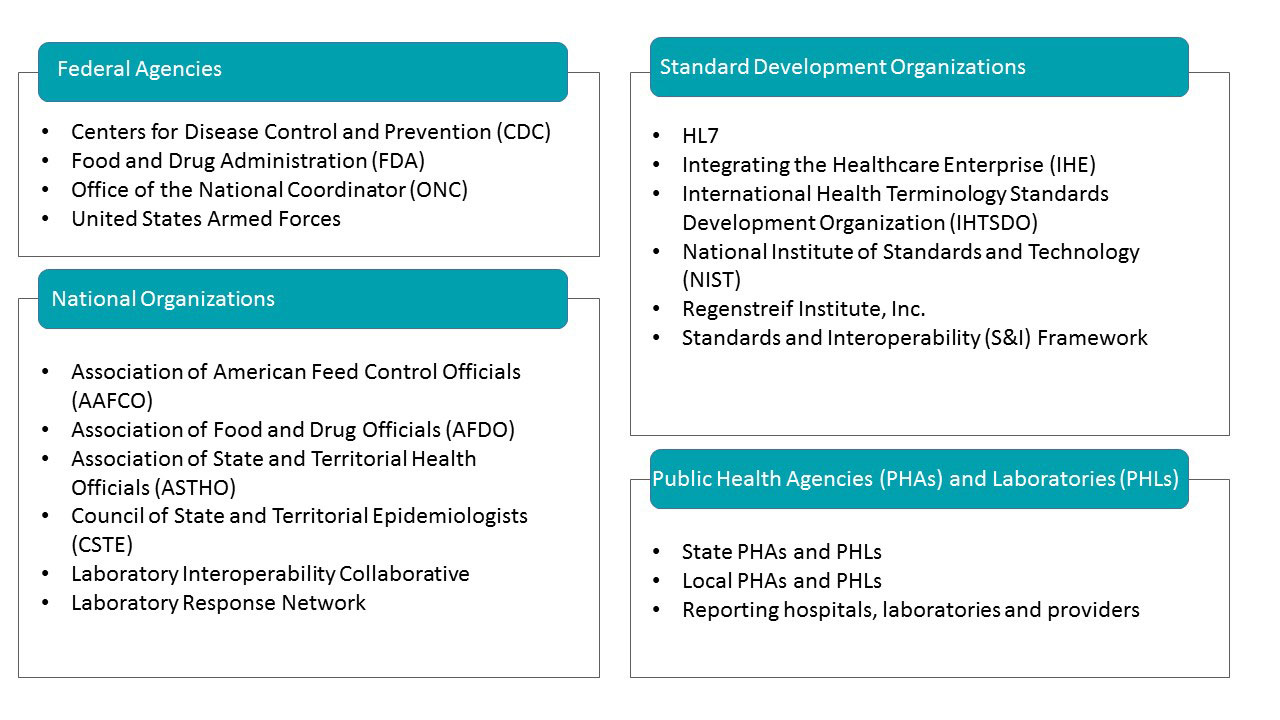For every specimen received at a public health laboratory, many different systems must be able to connect and share information to meet testing and reporting requirements. Whether it is laboratory instruments interfacing with information management systems, or public health agencies reporting notifiable cases to CDC, standards help systems to speak the same language.
APHL collaborates with public health partners to shape data exchange messaging standards to ensure interoperability across the public health community. It spearheads initiatives and develops tools to help streamline messaging and open doors to new data exchange partners.
Because collaboration is key to developing viable data exchange solutions, APHL works with public health partners, federal agencies and standards development organizations to develop messaging and data standards while integrating technology from the latest platforms. The association creates implementation guides, shape updates to code systems and engages the public health community to ensure interoperable data exchange solutions.
APHL Partners in Data Exchange: Public Health and Health Care
APHL collaborates with stakeholders from all arenas of public health and the health care industry to develop national and international standards for data exchange. Partners include:
Health Level 7 International (HL7), a not-for-profit, ANSI-accredited standards-developing organization that provides a framework and standards for the exchange, integration, sharing and retrieval of electronic health information.
Integrating the Healthcare Enterprise (IHE) , an initiative by healthcare professionals and industry to improve the way healthcare computer systems share information by promoting the coordinated use of established standards.
Logical Observation Identifiers Names and Codes (LOINC), a universal coding system developed by the Regenstrief Institute for identifying laboratory and clinical observations.
International Health Terminology Standards Development Organization (IHTSDO) , an organization that determines global standards for health terms and maintains the international terminology SNOMED CT, a universal coding standard for clinical terminologies.
Laboratory Messaging Community of Practice (LabMCop), a collaboration to harmonize messaging and coding approaches among laboratorians. Participants include state, local, CDC and national laboratories; professional associations; laboratory information systems; terminology service providers and the National Library of Medicine.
APHL Partners in Data Exchange: Federal Agencies and National Organizations
APHL also partners with federal and national organizations to promote the use of national data standards across healthcare and public health sectors.
Food and Drug Administration (FDA), a partnership with APHL, the Association of American Feed Control Officials and the Association of Food and Drug Officials to build an integrated laboratory system to advance the safety of food and animal feed.
Electronic Laboratory Reporting (ELR) Task Force , a collaborative effort between the Centers for Disease Control and Prevention, the Council of State and Territorial Epidemiologists and APHL to promote the implementation of ELR.
Office of the National Coordinator for Health Information Technology (ONC), the federal entity charged with national coordination to implement the most advanced health information technology and the electronic exchange of health information to improve health care.
Nationwide Health Information Network (NHIN), a program under ONC, provides a set of standards, services and policies that are helping to build a secure, nationwide health information infrastructure to connect health providers, consumers and others supporting health and healthcare.
National eHealth Collaborative (NeHC), established by a grant from ONC, brings together stakeholders from the public and private healthcare sectors who are committed to advancing health and improving healthcare by enabling secure and interoperable nationwide health information exchange.
Public Health Informatics Institute (PHII), a program of the Task Force for Global Health focusing on requirements development, training and facilitating meetings between public health professionals and their stakeholders.
Standards & Interoperability (S&I) Framework, a community launched by ONC to provide tools, services and guidance for public and private sector partners to facilitate the exchange of health information.
APHL Messaging Communities
APHL organizes community groups, including LIMS user groups, vocabulary harmonization workgroups and an Electronic Laboratory Reporting support group. For information, contact Linda Cohen, manager, Technical Assistance and Standards, at
linda.cohen@aphl.org.